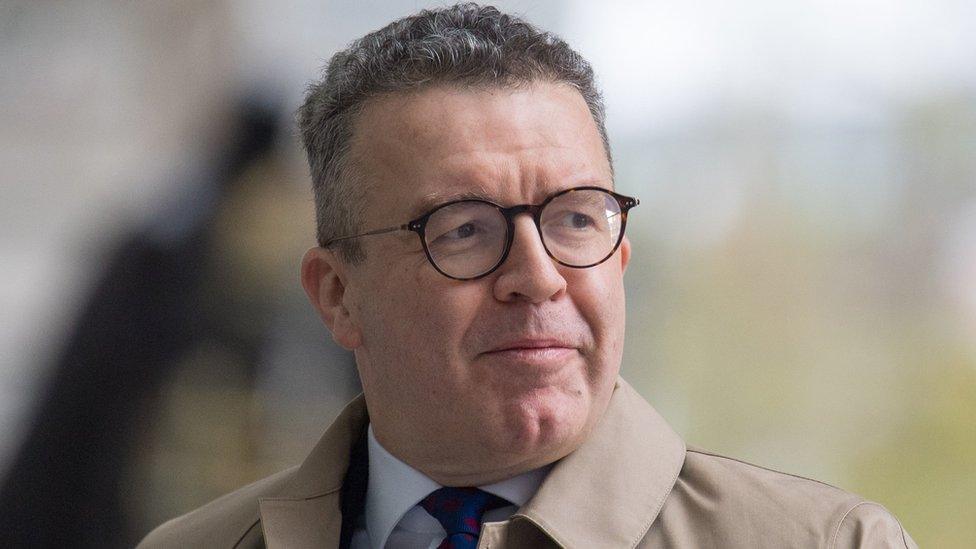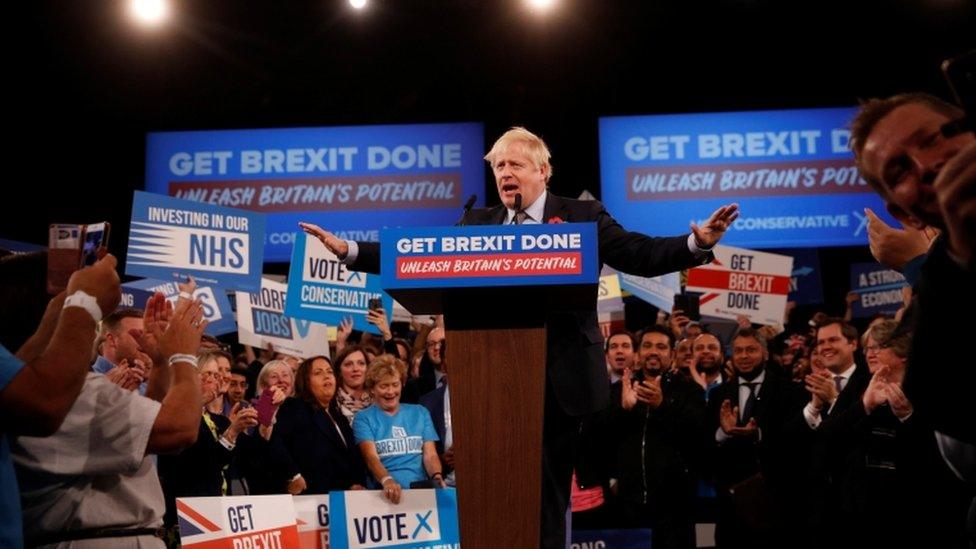General election 2019: Labour and Tories pledge more borrowing
- Published
- comments
John McDonnell: £150bn fund for "human emergency created by Tories"
Labour has promised "investment on a scale never seen before" to overhaul infrastructure in all areas of the UK.
Shadow Chancellor John McDonnell says he wants to transfer power and money out of the south-east of England - and will fund his plans through borrowing.
The Tories have also vowed to borrow to fund more spending, rewriting their current financial rules.
Chancellor Sajid Javid denied copying Labour's plans, saying he would practise "sensible stewardship".
But Liberal Democrat Treasury spokesman Ed Davey warned that both parties were "writing promises on cheques that will bounce".
Labour and the Conservatives say they want to take advantage of historically low interest rates to spend more on transport, hospitals and other infrastructure projects.
They are locked in a battle for votes in the Midlands and north of England in swing seats that could decide who forms the next government on 12 December.
Both parties are also promising to shift power and control of spending out of London - but they have different ideas about how to do that.
Speaking in Liverpool, Mr McDonnell promised to set up a Treasury unit in the north of England to take spending decisions out of Whitehall.
The Conservatives have promised to give the north of England more control over its railways, greater powers for some elected mayors and a new economic development body.
The campaign speeches over investment come as:
Former Labour MPs Ian Austin and John Woodcock called on voters to vote for the Conservatives
Pro-Remain parties Plaid Cymru, the Green Party and the Lib Dems agreed not to stand against each other in dozens of seats
Election officers hit back at calls from the education secretary for polling stations not to be placed in schools
Chancellor Sajid Javid attacks Labour's "fantasy economics"
At the 2017 general election, Labour announced plans to set up a national transformation fund to overhaul the UK's transport links and infrastructure.
This includes a social transformation fund, which Mr McDonnell said would now get an extra £100bn, providing a £150bn pot to be spent over the next five years.
A further £250bn of investment will be spent across the country through the Green Transformation Fund.
Mr McDonnell said the investment would help a Labour government address a "climate emergency", as well as a "human emergency which has been created by the Tories".
He said his party would introduce new fiscal rules, meaning "borrowing for investment" would not be included in borrowing targets.
He added the new approach would mean public assets created by infrastructure spending would be "recognised both as a cost and as a benefit".

What does a billion pounds really mean?

Politicians often talk of how many billions they would spend on schools, hospitals, upgrading roads, and so on.
A billion is a thousand million (or £1,000,000,000 written in full). It used to have a different meaning in the UK. Until the 1970s, it meant a million million, but Prime Minister Harold Wilson adopted the US definition.
With £1bn, you could pay the average full-time worker's salary nearly 33,000 times.
For a government, the cash doesn't go as far. It costs £1bn to run the NHS across the UK for just three days, according to the King's Fund.

But Mr Javid attacked Labour's investment plans, accusing the party of wanting to "spray money round like confetti", and indulging in "fantasy economics".
He said the "transformation" in the economy since the Conservatives took power "was not the result of some fiscal cycle", but "down to solid economic stewardship".
"By far the biggest fear of business is a Corbyn-led government," he added.

Analysis
BBC business correspondent Simon Gompertz
Both main parties now agree that this era of unusually low interest rates provides an opportunity to borrow to invest.
Both will push up the national debt.
Both argue that stepping up investment now will make the UK more productive later on.
The question, as ever, is how much will they borrow and how much debt they think the UK can support.
Labour is adding a cool £150bn to its investment plans over five years, a very big sum.
John McDonnell believes by spending on schools, hospitals and other infrastructure he would create a virtuous circle, a bigger economy which could afford the debt.
Sajid Javid would replace the Tories' self-imposed limits on borrowing with less stringent rules, including the promise that annual investment in projects like road and rail would not exceed 3% of national output.
He says the difference between his and Labour's plans is "like night and day" but, however they differ, debt looks set to rise.

Mr Javid said his plans to increase debt as a share of national income would increase spending by "an extra £20bn a year over a five year period".
He added that "you could easily add another £100bn to that" but the details would be set out in the Conservative manifesto.
And he said ending the uncertainty over Brexit was "the most important thing the economy needs right now", and would "unleash" more private investment.
Conservative leader Boris Johnson said the last nine years of his party's government had resulted in "solid growth", "record low" unemployment and the cost of borrowing "at an all-time low".
"It's thanks to the prudence of the Conservatives that we are able to make some investments in our infrastructure, in technology, in our public services and the reason we can do that is because we understand the vital importance of a strong economy," Mr Johnson said.
He said the "biggest threat" currently facing the UK economy was the "uncertainty that is still being posed to our political system by the whole Brexit debate", but his plan was to bring back his deal in December so the UK could leave the EU in January.
However, for the Liberal Democrats, Mr Davey said "any form of Brexit" would mean "less tax revenue" and would make the economy "weaker".
"Neither Labour or the Tories can square their spending promises today with the cost of Brexit," he said.
"In contrast, every vote for the Liberal Democrats is a vote to stop Brexit, build a brighter future and invest the £50bn Remain bonus in our vital public services and tackle inequality."


We have got into something of a bidding war between the two parties.
The Tories are talking about extra cash for police, for upgrading hospitals, for what they call an infrastructure revolution.
John McDonnell is talking about pouring hundreds of billions for a once-in-a-generation upgrade to the country's infrastructure.
They're on the same terrain - they're both talking about the end of austerity.
They're both talking about a big increase in government spending, and they're both talking about paying for this by borrowing.
The risk for the government is that they might be seen as "Labour-lite" - offering something similar, but not as ambitious.


What question do you have about the general election?
In some cases your question will be published, displaying your name, location and age as you provide it, unless you state otherwise. Your contact details will never be published. Please ensure you have read the terms and conditions.
Use this form to ask your question or get in touch using #BBCYourQuestions:
If you are reading this page and can't see the form you will need to visit the mobile version of the BBC website to submit your question.
- Published7 November 2019

- Published6 November 2019

- Published6 November 2019